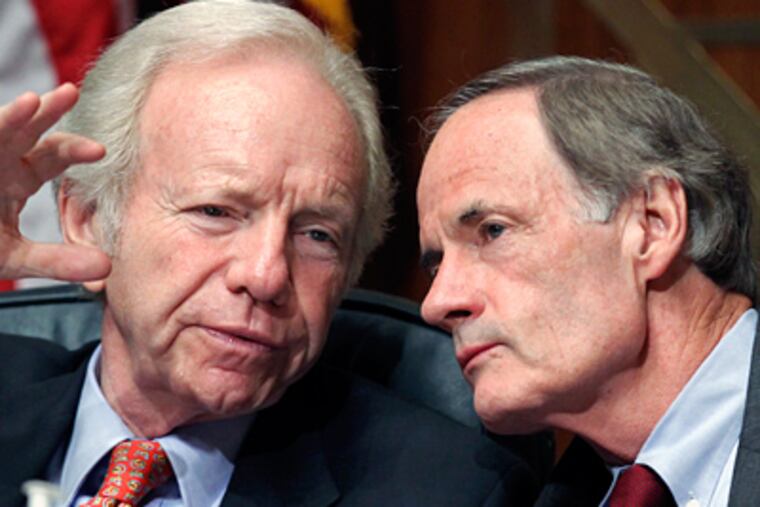PhillyDeals: Carper says USPS could avoid default by using the billions it prepaid in pensions
The U.S. Postal Service can delay its threatened Sept. 30 financial default by diverting up to $82 billion it has "overpaid" the Civil Service and Federal Employee Retirement Systems over the years and use the money to pay retired post office employees' health-care costs, ending a major drain on its cash, says Sen. Tom Carper (D., Del.).

The U.S. Postal Service can delay its threatened Sept. 30 financial default by diverting up to $82 billion it has "overpaid" the Civil Service and Federal Employee Retirement Systems over the years and use the money to pay retired post office employees' health-care costs, ending a major drain on its cash, says Sen. Tom Carper (D., Del.).
Carper introduced a bill in May that would allow the Postal Service to make the switch. His aides say the labor unions involved support the change because it would prevent radical cuts.
The Postal Service has systematically "prepaid" pensions more than it was required to do, Carper said at a Senate hearing Tuesday, citing reports from the inspector general, postal regulators, and private auditors. That, he said, amounts to subsidizing other federal agencies' pensions, which should have been taxpayer-funded - and will be in the future, if his fix goes through.
How money talks
Mother Jones, the liberal magazine cofounded by mining-fortune heir Adam Hochschild, infiltrated a recent political fund-raising retreat led by conservative Republican industrialists Charles and David Koch and made public, among other things, a list of donors they honored for giving large sums to key Republicans and their tea party allies.
Philadelphia-area names on the list include two men who got rich from mutual-fund fees: John Templeton, heir to the Templeton Funds fortune built by his father, and Foster Friess, retired founder of the research-intensive Brandywine Funds of Greenville, Del.
Friess, then a Chadds Ford resident, helped Richard Mellon Scaife fund Republican Rick Santorum's successful 1994 campaign for a U.S. Senate seat representing Pennsylvania, and led donors in a failed effort to dislodge then-Sen. Joe Biden (D., Del.) two years later.
After that 1996 race, Friess invited me on a bus trip, in which he was promoting private charity as a superior alternative to government social programs, to his political beneficiaries. We joined Santorum and then-Sen. John Ashcroft (R., Mo.), later George W. Bush's attorney general; Reps. Joe Pitts (R., Pa.) and J.C. Watts (R., Okla.), and political scientist John J. DiIulio, then at Princeton and later Bush's head of faith-based initiatives, on a ride to Deliverance Evangelistic Church in North Philly.
On the road, Santorum pontificated and avoided questions; Ashcroft complained about the Clinton administration; Pitts spoke knowledgeably about pending legislation; and Watts fell asleep.
At Deliverance, Friess introduced the Washington crowd and gave a fine talk on how Deliverance retail and shelter programs proved private charity trumped taxpayer handouts.
I pointed out how those programs were financed with city and federal funds. Friess called the politicians into executive session behind a closed door, then announced a $10,000 donation, regardless.
Friess' fund returns dipped after the dot.com collapse; he sold out and moved to Jackson Hole, Wyo. He's still backing small charities and big politicians: His personal website features GOP front-runner Rick Perry's claim that Social Security, as currently funded, is "a Ponzi scheme." And competition for the mutual-fund industry, he might have added.
Moving online
Yardley-based Journal Register Co. boss John Paton's job has been expanded to include running the larger Denver-based MediaNews Group Inc. newspaper chain through his new management company, Digital First Media, based in New York.
Journal Register is owned by New York investor Randall Smith's Alden Global Capital, which is also a major investor in MediaNews, in Inquirer owner Philadelphia Media Network, and other U.S. newspaper chains. They plan to consolidate production costs and move local news online.
Journal Register publishes the Delaware County Daily Times and other suburban dailies around Philadelphia and elsewhere. MediaNews publishes the Denver Post and the York (Pa.) Dispatch and Daily Record, among others. MediaNews boss Dean Singleton keeps the title of chairman; his retirement from day-to-day management was "a long time in the offing," spokeswoman Kathy Deveny told me.